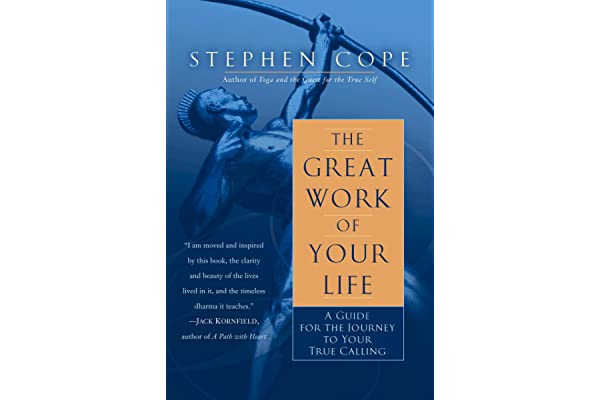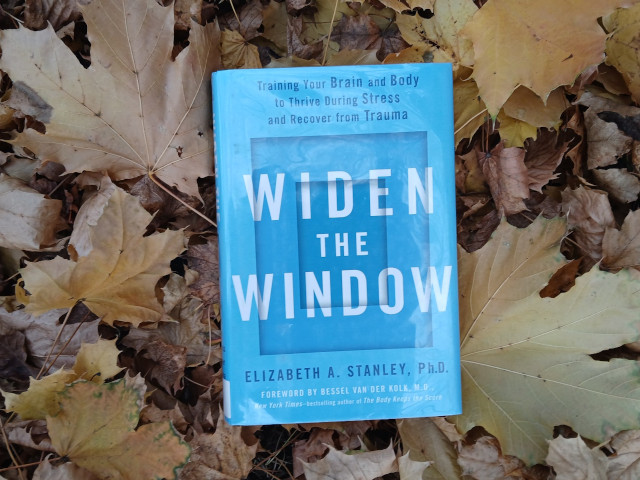
Hello everyone! I hope you have all been enjoying the emergence of spring. In Toronto, where I am, the weather has been just lovely. So lovely that I have been enjoying reading out of doors on my front porch, where I have planted some pretty geraniums and impatiens in pots.
I finished reading just three books this month, but two of them really blew me away and generated a lot of inspiration. I hope you find them helpful too.
The first book this month is The Great Work of your Life by Stephen Cope. I’ve read a couple of books by Stephen Cope in the past. In particular, I really enjoyed Yoga and the Quest for the True Self. But this book was a whole other level of awesome. It is based on the wisdom of the Bhagavad Gita, the Hindu spiritual book that is required reading for many yoga teacher trainings.
Before you distance yourself from this book thinking it sounds too foreign or weird, just listen for a minute. The book is focused on finding your dharma, calling it your most holy purpose in life. In essence, your dharma is your calling. It’s that thing you were born to do. That thing you find most enjoyable in life, that lifts your spirit and is your gift to the world. There’s nothing outrageous about that.
The book is filled with inspirational examples of people who followed their dharma, like the poets Walt Whitman and Robert Frost, and the naturalist Henry David Thoreau. He follows Susan B. Anthony in her quest for equal political representation for women, and psychologist Marion Woodman through her battle with cancer. Harriet Tubman and Mahatma Gandhi exemplify selflessness, and the courage required to buck popular thinking and go your own way. In between the famous examples, Cope also inserts people from his own life who struggled for a time and then managed to distill greater meaning and purpose from their own lives.
It may not sound like it, but it’s actually a page-turner, and an invigorating one at that. It is guaranteed to get you thinking about the meaning and purpose of your own life and how and where to find your dharma.
The second book I read this month is The Dante Club by Matthew Pearl. I actually didn’t like this book very much. This surprised me, because it’s a historical novel, which I normally love. It’s set during that often ignored, turbulent period just after the end of the US Civil War. President Lincoln has just been assassinated, the streets are awash in wounded soldiers, and now a string of grisly murders are being perpetrated in the streets of Cambridge, Massachusetts. The murders just happen to mimic the deaths described in Dante’s Divine Comedy, which is confusing, because the book had not yet been translated into the English language, so only an intellectual would know about it. The list of suspects is small.
After finishing this book, I looked back at the plot and the characters, trying to figure out why I found it so unsatisfying. I had no problems with the writing. The characters were distinctive and memorably drawn. If I had to make a criticism, I think maybe Pearl spent more time describing the mood of the time than he did advancing the plot, which caused the book to drag a little. But that’s just me. If you also enjoy historical fiction, you can give the book a whirl and let me know what you think. It’s possible it just caught me in an off mood. The book is a national best-seller, so it definitely has its fans.
The third book I read this month was Widen the Window: Training your Brain and Body to Thrive During Stress and Recover from Trauma by Elizabeth Stanley. I found this book absolutely fascinating! If you are an adult and have been alive on this earth for the past few decades, you need to read it. It’s all about trauma, stress tolerance and resilience.
In the first part of the book, Stanley describes the physical signs of unhealed stress and trauma. You will recognize plenty of them. The more periods of stress you have undergone in your life, without managing to heal, the narrower your window of tolerance for further stress. And who hasn’t been under a lot of stress over the last few years? Common signs of unhealed stress include greater emotional reactivity, poor decision-making, and the sudden surfacing of inexplicable health problems, to name just a few.
Stanley rose to the level of captain in the US Army before having something of a nervous breakdown. As she tried to recover, she did a lot of research on stress and trauma. She discovered scientifically proven methods for widening your window of tolerance and eventually created a program that the US Army now uses to prepare its soldiers for the stress and rigour of war. The exercises she outlines in the book can be used for everybody, not just soldiers. Anyone who is trying to heal from the cumulative stress and trauma of living in the 21st century on planet Earth would benefit from this book.
I hope you enjoyed reading my impressions of these books. Maybe you were even inspired to check one of them out! Until next month, enjoy the sun, and happy reading. 🙂
About the Author: Rebecca Wong has a BA in English Literature from the University of Waterloo and has been working in the herbal business since 2000. She studied at the Ontario College of Traditional Chinese Medicine under respected authorities Paul Des Rosiers and Vu Le, and graduated from the East West School of Planetary Herbology under Michael Tierra. She received training as a yoga teacher at The Branches in Kitchener/Waterloo, and therapeutic yoga teacher training from the School for Somatic Soulwork under Deniz Aydoslu. She now teaches yoga for anxiety, depression and burnout at Rebecca's Restful Yoga Studio in Toronto.



